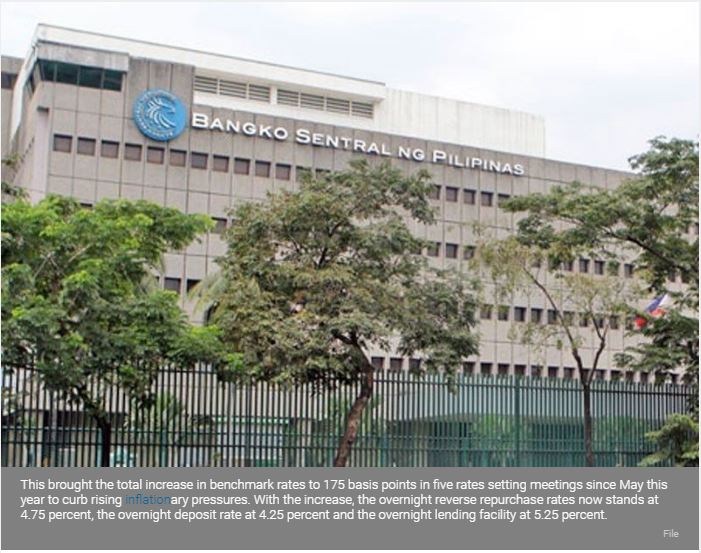Philippines: BSP delivers 5th rate hike in 2018
MANILA, Philippines — The Bangko Sentral ng Pilipinas (BSP) decided yesterday to raise anew policy interest rates by 25 basis points as part of a proactive action to help temper the rise in inflation.
This brought the total increase in benchmark rates to 175 basis points in five rates setting meetings since May this year to curb rising inflationary pressures. With the increase, the overnight reverse repurchase rates now stands at 4.75 percent, the overnight deposit rate at 4.25 percent and the overnight lending facility at 5.25 percent.
BSP officer-in-charge Maria Almasara Cyd Tuaño-Amador said the Monetary Board believes that prospects for the economy remain generally favorable and allow some scope for a measured adjustment in the policy rate to rein in inflation expectations and preempt further second-round effects.
The economy grew by only 6.1 percent in the third quarter from 6.2 percent in the second quarter and 6.6 percent in the first quarter as soaring inflation and rising interest rates pulled down private consumption.
“The latest real GDP growth number shows a growth of 6.1 percent for the third quarter. That is within the trend growth of the Philippine economy. It was against that basis that it is still a relatively resilient, relatively robust economy and still within trend growth and so they think the price stability objective can still be firmly safeguarded because the growth prospects of the economy continues to be cautiously optimistic,” Amador said.
Inflation averaged 5.1 percent in the first 10 months, exceeding the BSP’s two to four percent target, as the consumer price index (CPI) remained elevated at a near-decade high of 6.7 percent in October due to higher oil and food prices, weak peso, and the impact of Republic Act 10963 or the Tax Reform for Acceleration and Inclusion (TRAIN) Law.
The BSP deputy governor said monetary authorities deemed it necessary to respond with proactive policy action to help temper the risks to the inflation outlook, including those emanating from the continued uncertainty in the external environment amid tighter global financial conditions and trade tensions among major economies.
“After considering the impact of non-monetary measures, including the rice tariffication bill and the suspension of the oil excise tax, the Monetary Board decided to raise the policy rate by 25 basis points given the upside risks to the inflation outlook and given that inflation expectations have remained elevated as supply-side and possible wage pressures continue to drive price developments,” Amador said.
Amador said the Monetary Board sees inflation within the target band of two to four percent for 2019 and 2020 after considering he impact of non-monetary measures.
“Obviously the effectiveness or efficacy of the non-monetary measures will get some traction as we see the implementation of the programs, but we remain cautiously optimistic again as to the potency of these non-monetary measures,” she said.
According to Amador, it is also important to understand that sometimes these non-monetary measures could impact on sentiment and consumer behavior.
“So once you are able to rein in or anchor inflation expectations, then price and wage sectors will restrain in demanding high price pressures. So it is not only the actual implementation of these non-monetary measures but also its positive impact on consumer sentiment and consumer behavior,” she said.
Dennis Lapid, director of the BSP’s Department of Economic Research, said the Monetary Board raised its inflation forecast to 5.3 instead of 5.2 percent for this year due to recent movements in oil prices, the wage increase, transport fare hike as well as the updates in inflation and the data on GDP for the third quarter.
Lapid said the BSP is now looking at a lower inflation forecast of 3.5 instead of 4.3 percent for 2019 and higher at 3.3 instead of 3.2 percent for 2020.
Lapid said inflation is now expected to trend back to the BSP target range next year due to the passage by the Senate and the House of Representatives of the proposed amendments to Republic Act 8178 otherwise known as the Agricultural Tariffication Act of 1996 as well as the suspension of the increase of the excise tax on oil in January under the TRAIN Law.
“I think the latest view is that we are looking at a deceleration in inflation going forward and that is reflected in our forecasts as well,” Lapid said.
Source: https://www.philstar.com/business/2018/11/16/1868907/bsp-delivers-5th-rate-hike-2018#Cs9YfZHhYhCosB0u.99


 English
English




